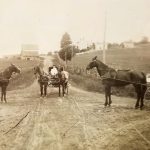Dry Tavern’s sobering name has a spirited history
 Photo courtesy of the Greene County Historical Museum
Photo courtesy of the Greene County Historical Museum
It doesn’t seem to be much of a mystery as to how the village of Dry Tavern in the northeastern corner of Greene County got its name.
“There was a tavern that did not serve alcohol,” said Rea Redd, who is director of the Eberly Library at Waynesburg University. “They were sprinkled throughout many states. ‘You can expect a meal and stay over, but we don’t serve alcohol.’ That was a trend in the early United States.”
While it’s quite obvious that a dry tavern once stood at the center of the unincorporated village in Jefferson Township, very little is known about the history of the tavern itself. It’s believed the inn was built along a heavily-traveled path in eastern Greene County to serve those who were passing through in the early 1800s.
“There isn’t a historical marker that says this is the original dry tavern,” Redd said.
But its location is thought to be somewhere near the crossroads of present-day Route 88 and Route 188 almost exactly halfway between Carmichaels and Clarksville, but the name and how long it operated are unknown. When Dry Tavern became a dot on the map is also a mystery.
According to “Local History of Greene County and Southwestern Pennsylvania” by Andrew J. Waychoff, the location was important because many travelers passed by it while heading north and south just a few miles west of the Monongahela River, making it a popular stopping point along the way.
“This was prominent because it was located on the principal road leading from Pittsburgh to Virginia, and is said to have had for years the most travel of any north and south road west of the mountains,” according to Waychoff’s book.
A map from 1790 at the Cornerstone Genealogy Society in Waynesburg shows there was no town named Dry Tavern at the time, with the location marked only as “The Park.” Another map from 1876 also doesn’t label Dry Tavern, with the parcel near the crossroads owned by a Miss R+M Martin and Wm. Devall, according to the map. Redd isn’t surprised by the lack of a formal designation since it’s a village tucked in Jefferson Township and has never been its own municipality.
But the “dry tavern” itself was an important and prominent directional marker for people living in the area at the time, as evidenced by multiple citations in the Waynesburg Republican around the turn of the 20th century, according to the newspaper’s archives stored at Cornerstone.
In one story from Aug. 12, 1884, about a ghastly collision between two bicycle riders and a horse-drawn buggy carrying two women who were badly injured, the newspaper describes the accident as happening “near what is known as the ‘Dry Tavern’ on the road.” Other articles in 1919 use “the dry tavern” as an explanation for where a new concrete road was being built from Waynesburg past Jefferson and onto modern-day Dry Tavern. It is even cited in newspaper stories to help explain directions for church group meetings.
But that all changed in 1921 after the concrete road was completed and the newspaper’s articles began referring to the area as Dry Tavern, removing the quotation marks and formalizing the title with capitalization.
Still, whatever happened to the tavern itself remains somewhat of a mystery.
An Observer-Reporter news story in September 1988 described the building as a “large” tavern that didn’t serve liquor, nor did it have a bar.
“Everyone who stopped over knew they could not get a drink of spirits,” according to the story.
Redd theorized the owners of the tavern might have had deeply-held Christian beliefs, which could have persuaded them not to serve alcohol at their inn.
“Maybe it was a dry congregation,” Redd said. “So there could be that aspect of it.”
But Dry Tavern is dry no more. Not with Caputo’s Dry Tavern Inn at what is thought to be close to where the inn once stood. The restaurant on Route 88 that is owned by Alice Caputo doesn’t have any connection to that original tavern once located nearby, but customers still enjoy a touch of irony that comes with her establishment’s name.
“Everyone thinks (the history) is great,” Caputo said in a 2018 interview about her restaurant’s name harkening back to the original dry tavern. “They buy shirts and hats.”

